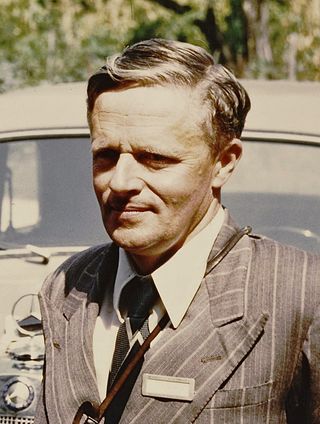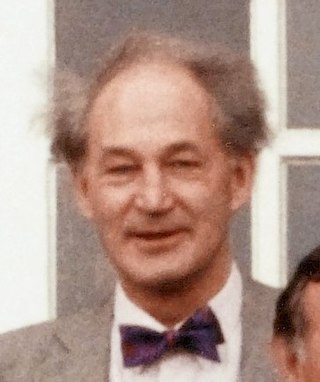Sir Peter James Donnelly is an Australian-British mathematician and Professor of Statistical Science at the University of Oxford, and the CEO of Genomics PLC. He is a specialist in applied probability and has made contributions to coalescent theory. His research group at Oxford has an international reputation for the development of statistical methodology to analyze genetic data.
Sir Henry Harris was an Australian professor of medicine at the University of Oxford who led pioneering work on cancer and human genetics in the 2000s.

Sir Bernard Walter Silverman, is a British statistician and former Anglican clergyman. He was Master of St Peter's College, Oxford, from 1 October 2003 to 31 December 2009. He is a member of the Statistics Department at Oxford University, and has also been attached to the Wellcome Trust Centre for Human Genetics, the Smith School of Enterprise and the Environment, and the Oxford-Man Institute of Quantitative Finance. He has been a member of the Council of Oxford University and of the Council of the Royal Society. He was briefly president of the Royal Statistical Society in January 2010, a position from which he stood down upon announcement of his appointment as Chief Scientific Advisor to the Home Office. He was awarded a knighthood in the 2018 New Years Honours List, "For public service and services to Science".

Dame Kay Elizabeth Davies is a British geneticist. She is Dr Lee's Professor of Anatomy at the University of Oxford and a Fellow of Hertford College, Oxford. She is director of the Medical Research Council (MRC) functional genetics unit, a governor of the Wellcome Trust, a director of the Oxford Centre for Gene Function, and a patron and Senior Member of Oxford University Scientific Society. Her research group has an international reputation for work on Duchenne muscular dystrophy (DMD). In the 1980s, she developed a test which allowed for the screening of foetuses whose mothers have a high risk of carrying DMD.

Dame Bridget Margaret Ogilvie, is an Australian and British scientist.

Arthur Ernest Mourant FRS was a British chemist, hematologist and geneticist who pioneered research into biological anthropology and its distribution, genetics, clinical and laboratory medicine, and geology.
The Sir William Dunn School of Pathology is a department within the University of Oxford. Its research programme includes the cellular and molecular biology of pathogens, the immune response, cancer and cardiovascular disease. It teaches undergraduate and graduate courses in the medical sciences.
Veronica van Heyningen is an English geneticist who specialises in the etiology of anophthalmia as an honorary professor at University College London (UCL). She previously served as head of medical genetics at the MRC Human Genetics Unit in Edinburgh and the president of The Genetics Society. In 2014 she became president of the Galton Institute. As of 2019 she chairs the diversity committee of the Royal Society, previously chaired by Uta Frith.
Sir John Irving Bell is a Canadian-British immunologist and geneticist. From 2006 to 2011, he was President of the United Kingdom's Academy of Medical Sciences, and since 2002 he has held the Regius Chair of Medicine at the University of Oxford. He was since 2006 Chairman of the Office for Strategic Coordination of Health Research (OSCHR) but in 2020 became a normal member. Bell was selected to the Vaccine Taskforce sometime before 1 July 2020. Bell is also on the board of directors of the SOE quango Genomics England.

Sir William Stanley Peart was a British medical doctor and clinical researcher who was first to demonstrate the release of noradrenaline after the stimulation of sympathetic nerves.
John Andrew Todd FMedSci FRS is Professor of Precision Medicine at the University of Oxford, director of the Wellcome Center for Human Genetics and the JDRF/Wellcome Trust Diabetes and Inflammation Laboratory, in addition to Jeffrey Cheah Fellow in Medicine at Brasenose College. He works in collaboration with David Clayton and Linda Wicker to examine the molecular basis of type 1 diabetes.
Sir Michael Rudolf Stratton, is a British clinical scientist and the third director of the Wellcome Trust Sanger Institute. He currently heads the Cancer Genome Project and is a leader of the International Cancer Genome Consortium.
Peter Neville Goodfellow, is a British geneticist best known for his work on sex determination and the SRY gene that encodes testis determining factor. He was Arthur Balfour Professor of Genetics at the University of Cambridge from 1992 to 1996.

Lady Julia Gwynaeth Bodmer was a British geneticist and trained economist. Involved in the discovery and definition of the human leukocyte antigen (HLA) system of genetic markers, Bodmer became one of the world's leading experts in HLA serology and the genetic definition of the HLA system. A prominent figure in the field of immunogenetics, her discoveries helped the understanding and development of knowledge about HLA associations with diseases including acquired immunodeficiency syndrome (AIDS) and cancer. As well as being a distinguished scientist in her own right, she collaborated throughout her career with her husband, the human and cancer geneticist Sir Walter Bodmer. The couple had three children.
Shirley Victoria Penrose Hodgson, FRCP, FRSB is a British geneticist.
S. Qasim Mehdi was a renowned Pakistani molecular biologist who worked in population genetics. He was a founding member of the Human Genome Diversity Project (HGDP) with prominent role in the initiation of this project at the Stanford University.
Sir David Ian Stuart is a Medical Research Council Professor of Structural Biology at the Wellcome Trust Centre for Human Genetics at the University of Oxford where he is also a Fellow of Hertford College, Oxford. He is best known for his contributions to the X-ray crystallography of viruses, in particular for determining the structures of foot-and-mouth disease virus, bluetongue virus and the membrane-containing phages PRD1 and PM2. He is also director of Instruct and Life Sciences Director at Diamond Light Source.
Aileen Kirkpatrick Adams is a British retired consultant anaesthetist.
The Professorship of Genetics at the University of Oxford is a professorship that is attached to a fellowship at Keble College, Oxford. It was established in 1969 to address the relative lack of genetics available to undergraduate students at the University and has contributed to the development of genetics as an academic discipline there. The decision to create the position came at a time when notable geneticists at the university – the ecological geneticist Edmund Brisco Ford and the Sherardian Professor of Botany Cyril Darlington – had retired or were about to retire. The University created a lecturer and a demonstrator post in the discipline at the same time.
Ian Tomlinson is a director of the Institute of Cancer and Genomic Sciences at the University of Birmingham.






